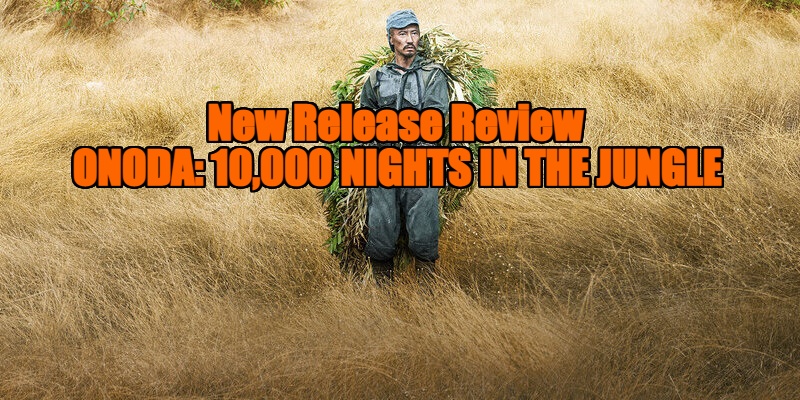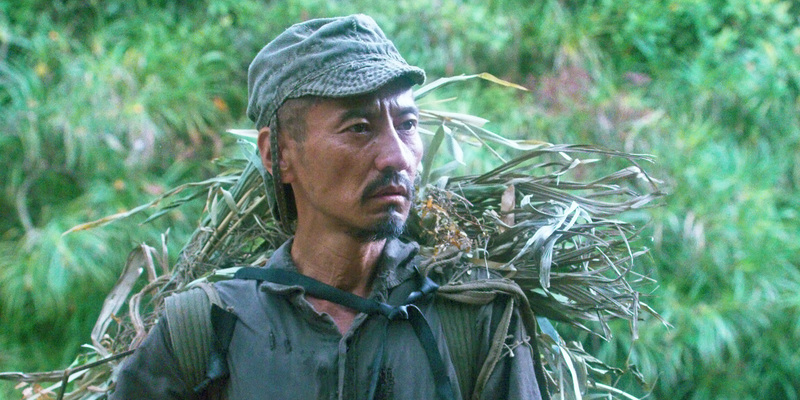
Review by
Benjamin Poole
Directed by: Arthur Harari
Starring: Yuya Endo, Kanji Tsuda, Shinsuke Kato, Kai Inowaki, Issey Ogata, Taiga Nakano

Pssst, did you hear the one about the WW2 Japanese soldier stationed on
some remote island who didn’t realise the war was over and carried on as a
commander for decades labouring on under the erroneous impression that
global conflict was still waging? Of course you did: it’s a popular modern
folklore beloved of racists like Michael off Alan Partridge, a derisive
embroidery retold in order to reinforce the superiority of the teller and
to belittle ‘the other’. In all honesty, I had dismissed the story
as an absurd confection, but, as ever, it transpires that the truth is
stranger than fiction: in Arthur Harari’s (with writing duties
shared by Bernard Cendro and Vincent Poymiro)
Onoda: 10,000 Nights in the Jungle the real-life experience
of Hiroo Onoda (that very soldier), is recounted in an epic story
exploring loyalty, duty and tragic fealty to authority. As it so often
does when the facile dimensions of war legends are detailed and linked to
the actual human beings involved, it turns out that the tale proper is at
once inspiring, moving and heartrendingly futile.

Onoda: 10,000 Nights in the Jungle’s plot is related across three intertwining time periods: Onoda’s
training as a young solider, the initial posting to Lubang Island in the
Philippines and early years of conflict, and the wilderness era of Onoda
wandering the forests alone, fulfilling his sworn oath to emperor and
country. The three are symbiotic as the actual reasons for Onoda’s
fidelity to his role are not due, the film suggests, to ignorance of wider
global events, but the pact he took to not surrender or take his own life.
During the preliminary sequences of training, we see Onoda’s (played here
by Yûya Endô) youthful verve and desire to serve his country ossify
into airtight conditioning, a calcification of personality and absolute
allegiance to the Japanese cause. A Japanese soldier ‘isn’t controlled by
his stomach’, and instead his duty is to ‘die for the emperor’, as a drill
instructor screams.

As a lifelong pacifist and mistruster of authority, the credo rests uneasy
with this reviewer (a theory: the reason why bad bunches triumph is their
unthinking conviction in their awful beliefs, the necessary lack of
perspective). Such pinko liberal thinking is entirely compounded by
Onoda: 10,000 Nights in the Jungle’s mise-en-scene. When we arrive at the island, it is completely
gorgeous. The frame fills with the deep, verdant colour of the Philippine
jungle - a site of such calm and emotive beauty that you wonder how any
unnatural violence could ever occur there. Of course, when Onoda and his
platoon - a right Dad’s Army - rock up, they bring conflict along with
them: blowing up bits of the island, menacing the peasant population, and
attracting the carnage of allied strikes. The jungle enacts a slow but
inexorable revenge, however, with the soldiers having to hard adapt to its
wild terrains and treacherous facets. Across the course of what becomes a
survivalist narrative of such dangers as typhoons, guerrilla fishermen and
disease (a particularly meaty sequence sees wounds infected by maggots -
ugh!), we witness, one by one, each of his compadres succumb, leaving
Onoda (by now played by the older Kanji Tsuda) alone.

Onoda: 10,000 Nights in the Jungle’s three hours proves to be utterly riveting (and the extended running
time is, of course, a necessary assimilation of the soldier’s enduring
stretch in the jungle). Harari is too judicious a filmmaker to
invite bias, and duly tells the story of this poor, deluded young/old man
with a thought-provoking objectivity. Exhausted, starved and waging a war
that the rest of the world would rather put behind it, but if Onoda is not
a soldier then what is he? His sense of duty has rotted into languid
habit, an inevitable consequence of societal indoctrination: it is the
only identity he has. His holdout nature reminds us of the aspects of
wartime we would perhaps rather forgo when things are not as immediate. An
individual desire to commit violence, and to willingly submit to authority
under the false auspices of patriotism, with our sense of humanity long
lost in the wilderness.

Onoda: 10,000 Nights in the Jungle is in UK cinemas from April 15th.

